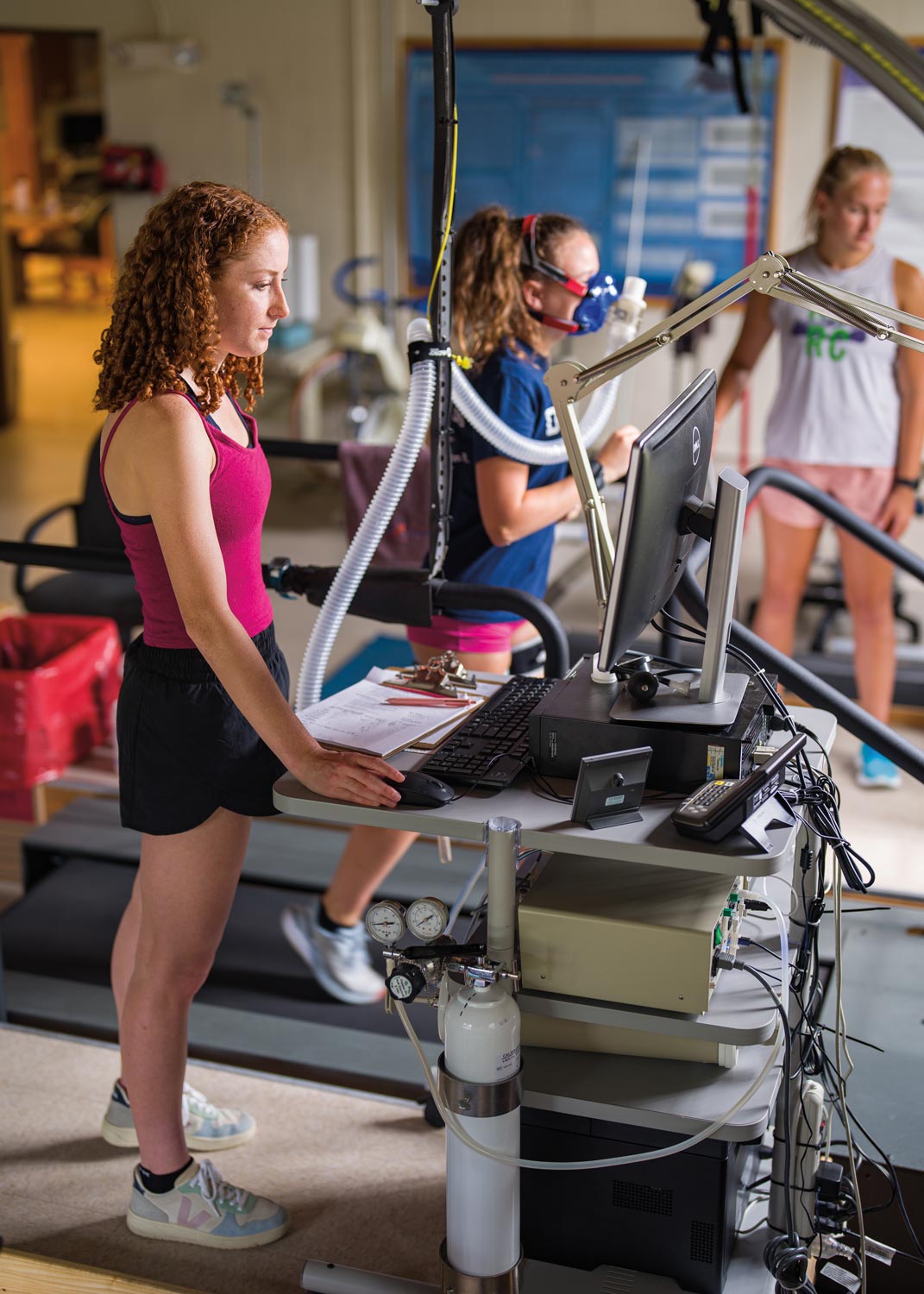Demetrius A. Phofolos ’22, a neuroscience and behavior major, conducts research for a SURF grant through the Hamel Center for Undergraduate Research in the salt marshes in Rowley, Massachusetts.
Research Rewind
Michelle Morrissey
Photos by
Scott Ripley and Jeremy Gasowski


Hamel Center for Undergraduate Research celebrates more than three decades of student inquiry
As college undergrads, UNH students have the opportunity to conduct meaningful research that could lead to curative treatments for cancer, provide real-world solutions to the climate crisis or help create common understanding of the political dynamics that play a part in global pandemics.
Yes, that’s undergraduates. While many think such high-level research might be reserved for those pursuing master’s or doctoral degrees, at UNH it’s been a regular part of the freshman-through-senior-year experience for more than three decades, through the Hamel Center for Undergraduate Research (HCUR).
Founded in 1987 as the Undergraduate Research Opportunities Program (UROP), the center provides fellowships and grants to students who, working with a faculty mentor, design and carry out research, as well as scholarly or creative projects. They also take part in the Undergraduate Research Conference (URC), which features more than 20 events each April and May in a campus-wide showcase for undergraduate scholarship. Open to the public, the URC invites attendees to peruse a roomful of research, with students presenting their findings and how they reached their conclusions.
Research Rewind

Demetrius A. Phofolos ’22, a neuroscience and behavior major, conducts research for a SURF grant through the Hamel Center for Undergraduate Research in the salt marshes in Rowley, Massachusetts.
Research Rewind


Hamel Center for Undergraduate Research celebrates more than three decades of student inquiry
Michelle Morrissey
Photos by
Scott Ripley and Jeremy Gasowski
As college undergrads, UNH students have the opportunity to conduct meaningful research that could lead to curative treatments for cancer, provide real-world solutions to the climate crisis or help create common understanding of the political dynamics that play a part in global pandemics.
Yes, that’s undergraduates. While many think such high-level research might be reserved for those pursuing master’s or doctoral degrees, at UNH it’s been a regular part of the freshman-through-senior-year experience for more than three decades, through the Hamel Center for Undergraduate Research (HCUR).
Founded in 1987 as the Undergraduate Research Opportunities Program (UROP), the center provides fellowships and grants to students who, working with a faculty mentor, design and carry out research, as well as scholarly or creative projects. They also take part in the Undergraduate Research Conference (URC), which features more than 20 events each April and May in a campus-wide showcase for undergraduate scholarship. Open to the public, the URC invites attendees to peruse a roomful of research, with students presenting their findings and how they reached their conclusions.
While other universities have similar academic initiatives to encourage undergraduate research, UNH’s HCUR is noteworthy in two main ways: that it is completely donor-funded, and it is one of the oldest university-wide undergraduate research centers in the country.
Paul Tsang, the center’s first faculty director (he’s also a professor of molecular, cellular and biomedical sciences), was appointed in 2011, taking over from founding director Donna Brown. He said students usually come to the center with a lot of curiosity and a bit of trepidation. “Sometimes they’ll come in and say, ‘My friend is doing research,’ or
‘I just heard about this place from my professor,’ or ‘I’m sort of interested in this topic,’ but they might not be sure about what it means to formally take on research.” That’s where Tsang and HCUR advisors come in, explaining how the center can help support the work they are interested in and providing guidance on how they might approach it.

Violet Sullivan ’23, exercise science major, works on her Hamel Center for Undergraduate Research project, a cardiorespiratory and metabolic comparison of blood flow during low-intensity and high-intensity running.
But Tsang is clear: this is student-driven work, not something assigned to them by faculty or staff.
“These are high-impact learning experiences, because it’s really about students pursuing an interest of theirs outside the classroom. The students are the drivers of the research, so they are learning the skillset needed to carry out these projects,” says Tsang. “It also gives them a leg up professionally or if they are thinking about graduate school, because they can demonstrate that they’ve pursued a different kind of education as part of their undergraduate careers.”
Students also gain confidence and build on their abilities to work with others, work independently, troubleshoot problems or bad results and present their research.
Those were exactly the effects on Jill Sible ’90.
Sible received a Summer Undergraduate Research Fellowship (SURF) in 1989 for her first research project, which allowed her to focus on the project and afford research expenses. As a result of the SURF, she published a first-author paper with her faculty mentor, Dr. Charles Walker, on cell cycle regulation in a starfish model.
“It was really eye-opening for me to see that in this world of academic research, how deeply one could dive into a problem, how collaborative that space was … that you could sit down with other people and problem-solve and hypothesize and try things out,” says Sible. “That wasn’t part of my world until I went to UNH. And I think that aha light bulb moment has stayed with me.”
Sible graduated from UNH with a degree in biochemistry and went on to earn a doctoral degree in cell, molecular and developmental microbiology from Tufts University. After a decade as a teaching professor, she is associate vice provost for undergraduate education and professor of biological sciences at Virginia Tech.
“It wasn’t until that paid opportunity through the Hamel Center that I could step away from all that external validation of grades and working. To work on real-world problems in a less-conventional space was the game changer for me.”
— Jill Sible ’90
In some ways, her academic path has come full circle, as part of her role at Virginia Tech is to work with others to increase VT’s undergraduate research opportunities.
“Employers are really looking for hands-on, truly real-world experiences, so we feel that’s the most important opportunity our students can have. Here at Virginia Tech, we’re building it into every degree,” says Sible.
“I see so many students who want to fill their resumes so broadly with a litany of amazing experiences, but they can’t run too deep,” she explains. Undergraduate research provides that needed deep-dive opportunity. “These types of experiences give them the permission to explore their passions for a semester or more.”
Sible says her UNH experience was a game changer in not only her college journey, but her career path as well.
“I worked very hard like many first-generation students at college; I worked at a grocery store to help pay for college, and my grades seemed really important. I was striving for perfection in all my classes just like I had in high school,” Sible explains. “It wasn’t until that paid opportunity through the Hamel Center that I could step away from all that external validation of grades and working. To work on real-world problems in a less-conventional space was the game changer for me. Even though I never left academics, and I loved my coursework all the way through graduate school, that more authentic experience had such an impact on me. It wasn’t prescribed or dictated by someone else.”
That freedom to explore is exactly what the founders had in mind, says HCUR founding director Donna Brown.
In the mid-1980s, Brown was approached by then-Honors Program director Robert Mennel, a professor in the classics department. For a year, they consulted other colleges and universities to learn best practices around launching an undergraduate research program, with Brown spending a sabbatical at Cal Tech, eventually modeling much of UNH’s program after Cal Tech’s.
From the very beginning, both agreed it had to be open to students in all areas of study and majors, a hallmark of the HCUR that continues today. “What pleased us early on was the good response from liberal arts students like those in studio art or music. Once we started supporting international opportunities, we got a lot of nursing students,” who typically aren’t able to take part in traditional study-abroad opportunities, but who could perform research internationally as part of their regular academic programs.
“When you go to your classes, you’re studying what your teacher tells you and it’s pretty structured, but when you get into research, there’s a certain amount of creativity to it,” says Brown. “It encourages maturation, thinking more interdependently, professionalism and of course, confidence.”
Brown says the gift to endow the HCUR from philanthropist Dana Hamel in 2004 was a game changer for the program.
Other donors were inspired and followed suit, knowing that their financial support meant students could pursue their passions and make some groundbreaking discoveries along the way. Donors continue to support the students’ work — during UNH’s (603) Challenge fundraising event each year, for example, and also through new endowments. Every donation, no matter the size, gives students the chance to take part in research.
Tsang says students are encouraged to push the envelope a bit, to have a goal of adding to the knowledge base in a certain area. “I tell them wouldn’t it be nice if you opened up a textbook and you see your name as someone whose research was a contribution to that field?
— Material from Inquiry Journal by
Savannah Salvage was used in this story.

What They’re Researching
Curious exactly what Hamel Center students are working on? Check out the 2022 issue of the Inquiry Journal (www.unh.edu/inquiryjournal), or peruse the center’s blog to read up on the latest projects (www.unh.edu/undergrad-research/blog).